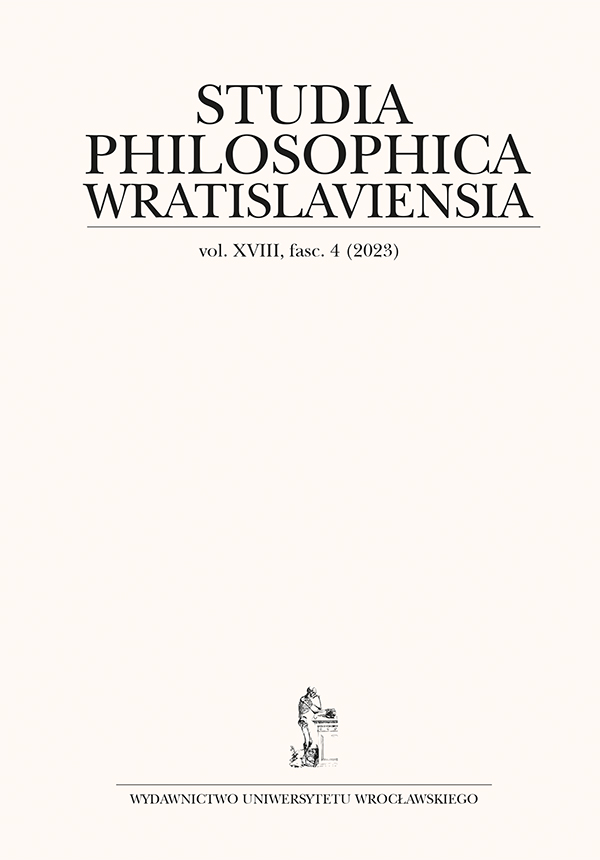

Artykuły

After a critical analysis of Simone de Beauvoir’s and Catherine Malabou’s accounts of aging, the paper offers an alternative to them. In contrast to de Beauvoir and Malabou, it explores the actual share of other beings, both human and non-human, in one’s aging. The paper employs the Heideggerian ontological framework and his concepts of “bodying” and gesture to argue that changes induced by others do not damage or contaminate one’s being but allow the disclosure of someone’s particularity in its undefinable character.
Aho K., Heidegger’s Neglect of the Body, New York 2009.
Aho K., “The Contraction of Time and Existential Awakening: A Phenomenology of Authentic Aging,” [in:] The Evening of Life: The Challenges of Aging and Dying Well, P. Scherz, J.E. Davis (eds.), Notre Dame 2020, pp. 78–93.
Bavidge M., “Feeling One’s Age: A Phenomenology of Aging,” [in:] The Palgrave Handbook of the Philosophy of Aging, G. Scarre (ed.), London 2016, pp. 207–224.
Blok V., “Heidegger’s Ontology of Work,” Heidegger Studies 31 (2015), pp. 109–128.
Clark S., “Strange Strangers and Uncanny Hammers: Morton’s ‘The Ecological Thought’ and the Phenomenological Tradition,” Green Letters 17 [2] (2013), pp. 98–108, doi: 10.1080/14688417.2013.800339.
de Beauvoir S., The Coming of Age, transl. P. O’Brain, New York 1972.
Dolezal L., “Reconsidering the Look in Sartre’s ‘Being and Nothingness’,” Sartre Studies International 18 [1] (2012), pp. 9–28.
Fisher L., “The Other Without and the Other Within: The Alterity of Aging and the Aged in Beauvoir’s ‘The Coming of Age’,” [in:] Simone de Beauvoir’s Philosophy of Age Gender, Ethics, and Time, S. Stoller (ed.), Berlin 2014, pp. 107–122.
Gilleard C., “Aging as Otherness: Revisiting Simone de Beauvoir’s Old Age,” Gerontologist 62 [2] (2022), pp. 286–292, doi: 10.1093/geront/gnab034.
Heidegger M., Being and Time, transl. J. Macquarrie, E. Robinson, New York 1962.
Heidegger M., Nietzsche, vol. I, transl. D.F. Krell, San Francisco 1991.
Heidegger M., The Basic Problems of Phenomenology, transl. A. Hofstadter, Bloomington 1988.
Heidegger M., What is a Thing?, transl. W.B. Barton, V. Deutsch, South Bend, IN 1967.
Heidegger M., Zollikon Seminars, transl. F. Mayr, R. Askay, Evanston, IL 2001.
Heinämaa S., “Transformations of Old Age Selfhood, Normativity, and Time,” [in:] Simone de Beauvoir’s Philosophy of Age: Gender, Ethics, and Time, S. Stoller (ed.), Berlin 2014, pp. 167–190.
Hoły-Łuczaj M., “Shapeability—Aristotle on Poiein-Paschein and the Other Dimension of Being in Heidegger,” South African Journal of Philosophy 41 [1] (2022), pp. 37–48, doi: 10.1080/02580136.2021.2025326.
Kleinberg-Levin D., Gestures of Ethical Life: Reading Hölderlin’s Question of Measure After Heidegger, Stanford 2005.
Krell D.F., Daimon Life. Heidegger and Life Philosophy, Bloomington 1992.
Malabou C., Ontology of Accident: An Essay on Destructive Plasticity, transl. C. Shread, Malden 2013.
Malabou C., The New Wounded: From Neurosis to Brain Damage, transl. S. Miller, New York 2012.
McLennan M., “Beauvoir’s Concept of ‘Decline’,” Feminist Philosophy Quaterly 6 [3] (2020), pp. 1–17, doi: 10.5206/fpq/2020.3.7929.
Nussbaum M., Levmore S., Aging Thoughtfully: Conversations about Retirement, Romance, Wrinkles, and Regret, New York 2017.
Palmer J., “Catherine Malabou, ‘The Ontology of the Accident: An Essay on Destructive Plasticity’ [review],” Oxford Literary Review 36 [1] (2014), pp. 141–145, doi: 10.3366/olr.2014.0092
Stoller S., “We in the Other, and the Child in Us: The Intersection of Time in Beauvoir and Merleau-Ponty,” [in:] Simone de Beauvoir’s Philosophy of Age Gender, Ethics, and Time, S. Stoller (ed.), Berlin 2014, pp. 195–210.
Witty K., “Uncanniness,” [in:] The Cambridge Heidegger Lexicon, M. Wrathall (ed.), Cambridge 2021, pp. 789–791.